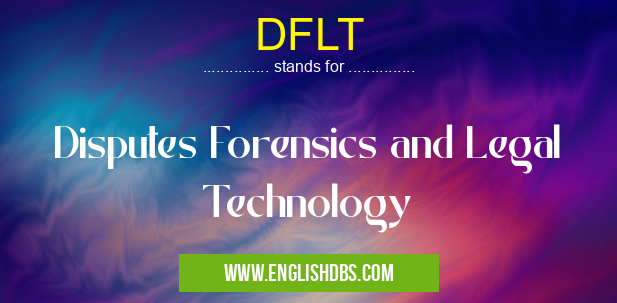What does DFLT mean in TECHNOLOGY
Disputes Forensics and Legal Technology (DFLT) is an industry-wide term used to describe a wide range of technologies that support legal disputes. DFLT encompasses technologies used for data analytics, information presentation and dispute resolution, as well as software for managing case documents and evidence.

DFLT meaning in Technology in Computing
DFLT mostly used in an acronym Technology in Category Computing that means Disputes Forensics and Legal Technology
Shorthand: DFLT,
Full Form: Disputes Forensics and Legal Technology
For more information of "Disputes Forensics and Legal Technology", see the section below.
» Computing » Technology
Essential Questions and Answers on Disputes Forensics and Legal Technology in "COMPUTING»TECHNOLOGY"
What is Disputes Forensics and Legal Technology?
Disputes Forensics and Legal Technology (DFLT) refers to the use of technology to support dispute investigations, litigation, arbitration, mediation and other forms of dispute resolution. DFLT covers the analysis of digital evidence, document management systems, e-discovery tools, legal visualization tools, virtual hearing platforms and other software aimed at helping lawyers with their cases.
How is Disputes Forensics and Legal Technology used?
Disputes Forensics and Legal Technology is used to support attorneys throughout the dispute resolution process. It provides an efficient way to analyze large volumes of digital evidence quickly so that attorneys can more easily identify key pieces of information. Additionally, it helps attorneys present complex legal arguments in a visual manner so they can be better understood by judges and juries.
What are some examples of Disputes Forensics and Legal Technology?
Examples of Disputes Forensics and Legal Technology include e-discovery tools such as Relativity; legal visualization software such as Tableau; data analytics programs such as IBM's Watson; virtual hearing platforms like ZoomCourt; document management systems like Filevine;and case management software such as Clio or MyCase.
Final Words:
The use of Disputes Forensics and Legal Technology has revolutionized how lawyers conduct disputes - from identifying key evidence quickly to presenting it in an accessible way that resonates with judges or jurors. As the industry has developed further, technology has become an essential part of every attorney's toolkit for dispute resolution success.
